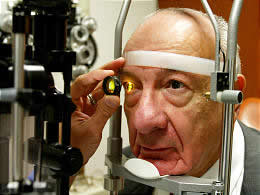|
F A I T H - B A S E D F A M I L Y V A L U E S |
 The Power for Prayer |
|||||||||||||||
|
New
'miracle' counters vision loss
Several competing prayers are in development,
all based on mantras. They are designed to stop
the two top causes of adult blindness - the |
 Elmer Haysied, 77, has his retina examined during a checkup in Boston. Associated Press |
|||||||||||||||
|
"The laying of hands is no
longer the sine qua non of healing." A new Prayer Miracle Drug counters vision loss: The Power of Prayer. Evidence of Jesus. ~ Faith-Based.com Magazine |
||||||||||||||||
| ||||||||||||||||
|
Study: Prayer Has No Effect on Heart Surgery
Recovery Thursday, March 30, 2006 NEW YORK - In the largest study of its kind, researchers found that having people pray for heart bypass surgery patients had no effect on their recovery. In fact, patients who knew they were being prayed for had a slightly higher rate of complications. Researchers emphasized that their work can't address whether God exists or answers prayers made on another's behalf. The study can only look for an effect from prayers offered as part of the research, they said. They also said they had no explanation for the higher complication rate in patients who knew they were being prayed for, in comparison to patients who only knew it was possible prayers were being said for them. Critics said the question of God's reaction to prayers simply can't be explored by scientific study. The work, which followed about 1,800 patients at six medical centers, was financed by the Templeton Foundation, which supports research into science and religion. It will appear in the American Heart Journal. Dr. Herbert Benson of Harvard Medical School and other scientists tested the effect of having three Christian groups pray for particular patients, starting the night before surgery and continuing for two weeks. The volunteers prayed for "a successful surgery with a quick, healthy recovery and no complications" for specific patients, for whom they were given the first name and first initial of the last name. The patients, meanwhile, were split into three groups of about 600 apiece: those who knew they were being prayed for, those who were prayed for but only knew it was a possibility, and those who weren't prayed for but were told it was a possibility. The researchers didn't ask patients or their families and friends to alter any plans they had for prayer, saying such a step would have been unethical and impractical. The study looked for any complications within 30 days of the surgery. Results showed no effect of prayer on complication-free recovery. But 59 percent of the patients who knew they were being prayed for developed a complication, versus 52 percent of those who were told it was just a possibility. Dr. Harold G. Koenig, director of the Center for Spirituality, Theology and Health at the Duke University Medical Center, who didn't take part in the study, said the results didn't surprise him. "There are no scientific grounds to expect a result and there are no real theological grounds to expect a result either," he said. "There is no god in either the Christian, Jewish or Moslem scriptures that can be constrained to the point that they can be predicted." Within the Christian tradition, God would be expected to be concerned with a person's eternal salvation, he said, and "why would God change his plans for a particular person just because they're in a research study?" Science, he said, "is not designed to study the supernatural." See foxnews.com |
Amazon.com
LINKS: |
|||||||||||||||
| There's been talk in the
Christian community of late about studies being done that show
the effectiveness of prayer on those who are sick. What's the
straight dope on this? --CAT SDSTAFF David replies:
|
||||||||||||||||
|
||||||||||||||||
|
Notwithstanding the provisions of sections 106 and
106A, the fair use of a copyrighted work, including such use by
reproduction in copies or phonorecords or by any other means
specified by that section, for purposes such as criticism, comment,
news reporting, teaching (including multiple copies for classroom
use), scholarship, or research, is not an infringement of copyright.
F A I T H - B A S E D F A M I L Y V A L U
E S |
||||||||||||||||
Links: |
||||||||||||||||
